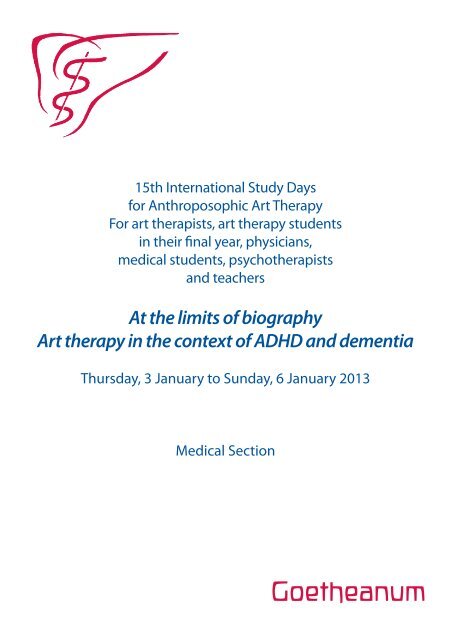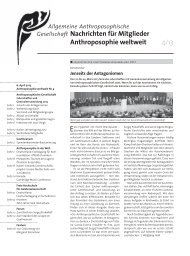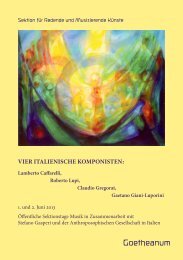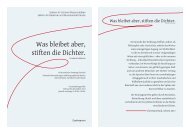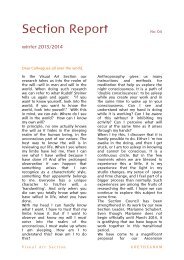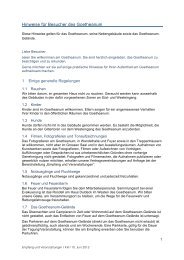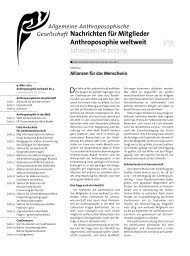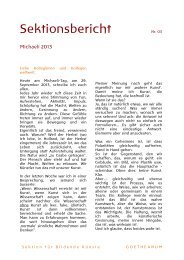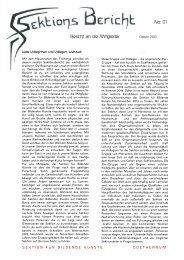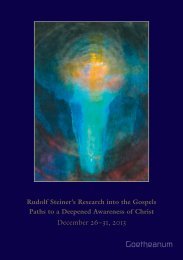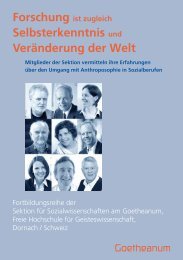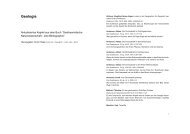At the limits of biography Art therapy in - Goetheanum
At the limits of biography Art therapy in - Goetheanum
At the limits of biography Art therapy in - Goetheanum
You also want an ePaper? Increase the reach of your titles
YUMPU automatically turns print PDFs into web optimized ePapers that Google loves.
15th International Study Days<br />
for Anthroposophic <strong>Art</strong> Therapy<br />
For art <strong>the</strong>rapists, art <strong>the</strong>rapy students<br />
<strong>in</strong> <strong>the</strong>ir f<strong>in</strong>al year, physicians,<br />
medical students, psycho<strong>the</strong>rapists<br />
and teachers<br />
<strong>At</strong> <strong>the</strong> <strong>limits</strong> <strong>of</strong> <strong>biography</strong><br />
<strong>Art</strong> <strong>the</strong>rapy <strong>in</strong> <strong>the</strong> context <strong>of</strong> ADHD and dementia<br />
Thursday, 3 January to Sunday, 6 January 2013<br />
Medical Section<br />
Goe<strong>the</strong>anum
2<br />
Dear Colleagues,<br />
We wish to <strong>in</strong>vite you very warmly to <strong>the</strong> 15th International Study Days for<br />
Anthroposophic <strong>Art</strong> Therapy. The <strong>the</strong>me <strong>of</strong> <strong>the</strong> conference, “<strong>At</strong> <strong>the</strong> <strong>limits</strong> <strong>of</strong><br />
<strong>biography</strong>”, addresses a broad spectrum <strong>of</strong> work areas <strong>in</strong> art <strong>the</strong>rapy. The aspect<br />
<strong>of</strong> a collaborative approach <strong>in</strong>volv<strong>in</strong>g art <strong>the</strong>rapy will be looked at not just with<br />
regard to medic<strong>in</strong>e but also education, special needs education and gerontology.<br />
We are <strong>in</strong>terested <strong>in</strong> questions such as how people enter <strong>the</strong> world today, which<br />
impulses <strong>the</strong>y br<strong>in</strong>g with <strong>the</strong>m and <strong>the</strong> issues we encounter <strong>in</strong> <strong>the</strong>m. How do we<br />
treat children who already “know” everyth<strong>in</strong>g and can no longer be childlike?<br />
How do we approach <strong>the</strong> elderly person suffer<strong>in</strong>g from dementia for example?<br />
What are our attitudes <strong>in</strong> deal<strong>in</strong>g with death. In a number <strong>of</strong> cultures, old people<br />
are venerated as bearers <strong>of</strong> wisdom. In our society <strong>the</strong>y tend to be <strong>in</strong>fantilised.<br />
But children, by contrast, are already expected to know and be able to do a lot by<br />
<strong>the</strong> age <strong>of</strong> three. What role does our western culture play <strong>in</strong> deal<strong>in</strong>g with children<br />
and <strong>the</strong> elderly? Can we learn to understand <strong>the</strong> symptoms <strong>of</strong> ADHD and dementia<br />
better and respond <strong>the</strong>rapeutically if we turn our attention to <strong>the</strong> time before birth<br />
and after death?<br />
Throughout <strong>the</strong> conference we would like to jo<strong>in</strong> with you <strong>in</strong> look<strong>in</strong>g at <strong>the</strong> practice<br />
<strong>of</strong> art <strong>the</strong>rapy <strong>in</strong> <strong>the</strong> various fields from <strong>the</strong> perspective <strong>of</strong> our understand<strong>in</strong>g <strong>of</strong> <strong>the</strong><br />
human be<strong>in</strong>g, education and medic<strong>in</strong>e and to work on <strong>the</strong>rapeutic approaches.<br />
The morn<strong>in</strong>g sem<strong>in</strong>ar groups are <strong>in</strong>tended to facilitate a liv<strong>in</strong>g exchange <strong>of</strong> views<br />
about our work. The work <strong>in</strong> <strong>the</strong> sem<strong>in</strong>ars is <strong>of</strong>fered on an <strong>in</strong>terdiscipl<strong>in</strong>ary basis so<br />
that <strong>the</strong> perception <strong>of</strong> one ano<strong>the</strong>r among <strong>the</strong> various arts can grow. The afternoon<br />
work<strong>in</strong>g groups are <strong>in</strong>tended to focus on active creative work <strong>in</strong> art <strong>the</strong>rapy.<br />
Speakers from various fields <strong>of</strong> work such as Michael Ganss (art <strong>the</strong>rapists/<br />
gerontologist), Bernd Ruf (special needs teacher), Dr. med. Andreas Rothdach<br />
and Pr<strong>of</strong>. Dr. med. Peter Selg will, alongside many o<strong>the</strong>r lecturers, <strong>in</strong>itiate an<br />
<strong>in</strong>tensive exchange <strong>of</strong> experiences.<br />
For <strong>the</strong> first time next year, we <strong>of</strong>fer <strong>the</strong> opportunity <strong>of</strong> group accommodation at<br />
a price <strong>of</strong> CHF 10.00/night. If you wish to avail yourself <strong>of</strong> this <strong>of</strong>fer please register<br />
with Sab<strong>in</strong>e Theyssen by 20 September 2012.<br />
Sab<strong>in</strong>e.Theyssen@gmx.de<br />
We hope to whet your <strong>in</strong>terest with this conference and look forward to a lively<br />
<strong>in</strong>terdiscipl<strong>in</strong>ary exchange <strong>of</strong> views with you. Please also pass on <strong>the</strong> conference<br />
documents to any colleagues who might be <strong>in</strong>terested – many thanks!<br />
With warm greet<strong>in</strong>gs,<br />
Dr. med. Michaela Glöckler – Section head<br />
Kirst<strong>in</strong> Kaiser, Ulrike Gerharz and Viola Heckel – Conference preparation<br />
I <strong>At</strong> <strong>the</strong> <strong>limits</strong> <strong>of</strong> <strong>biography</strong> <strong>Art</strong> <strong>the</strong>rapy <strong>in</strong> <strong>the</strong> cotext <strong>of</strong> ADHD and dementia
Interdiscipl<strong>in</strong>ary sem<strong>in</strong>ar groups<br />
1. Barbara Jaggi-Sidler, Dr. med. Kaspar Jaggi<br />
On <strong>the</strong> heavenly forces <strong>of</strong> heal<strong>in</strong>g and preserv<strong>in</strong>g health<br />
If, as <strong>the</strong>rapists, we wish to perceive and treat one-sided processes <strong>in</strong> children<br />
and <strong>the</strong> elderly, we must experience, recognise and ma<strong>in</strong>ta<strong>in</strong> <strong>the</strong> underly<strong>in</strong>g<br />
forces with<strong>in</strong> ourselves: <strong>the</strong> nourish<strong>in</strong>g formative force <strong>of</strong> Gabriel, <strong>the</strong> heal<strong>in</strong>g<br />
breath<strong>in</strong>g force <strong>of</strong> Raphael, <strong>the</strong> perceptive th<strong>in</strong>k<strong>in</strong>g force <strong>of</strong> Uriel, <strong>the</strong> mov<strong>in</strong>g active<br />
force <strong>of</strong> Michael.* Through practice, we will seek <strong>the</strong>se elements with <strong>the</strong> help <strong>of</strong><br />
movement <strong>in</strong> eurythmy and <strong>in</strong> conversation so that we can utilise <strong>the</strong>m hygienically<br />
<strong>in</strong> ourselves and <strong>the</strong>rapeutically <strong>in</strong> children and <strong>the</strong> elderly. With eurythmy, also without<br />
any prior knowledge. *GA 229, above all <strong>the</strong> fifth lecture <strong>of</strong> 13 October 1923.<br />
2. Dr. med. Jürgen Möller, Dagmar von Freytag-Lor<strong>in</strong>ghoven<br />
Ways <strong>of</strong> understand<strong>in</strong>g and approach<strong>in</strong>g AD(H)D<br />
Ways <strong>of</strong> understand<strong>in</strong>g and approach<strong>in</strong>g AD(H)D as delayed <strong>in</strong>carnation<br />
Rudolf Ste<strong>in</strong>er’s anamnesis questions. Diagnos<strong>in</strong>g <strong>the</strong> components <strong>of</strong> <strong>the</strong><br />
human be<strong>in</strong>g as <strong>the</strong> basis for nuanced treatment (<strong>in</strong>clud<strong>in</strong>g on request: which<br />
medication). What errors and traps are <strong>the</strong>re <strong>in</strong> deal<strong>in</strong>g with <strong>the</strong>se children?<br />
What are <strong>the</strong> prerequisites for a good prognosis. How can <strong>in</strong>tervention through<br />
art <strong>the</strong>rapy be developed and <strong>in</strong> which context is it helpful? (German)<br />
3. Viola Heckel, Jacques Meulman<br />
ADHD – <strong>the</strong> child’s healthy reaction to a sick environment. What consequences<br />
arise as a result with regard to treatment?<br />
In this sem<strong>in</strong>ar group we will study how we can f<strong>in</strong>d access to an archetypal<br />
rhythm through hear<strong>in</strong>g and how we can <strong>the</strong>reby build a bridge between <strong>the</strong><br />
<strong>in</strong>ner and <strong>the</strong> outer world. Exchange <strong>of</strong> experiences with practical exercises from<br />
talk<strong>in</strong>g and music <strong>the</strong>rapy. (German)<br />
4. Dr. med. Michaela Glöckler<br />
On a spiritual understand<strong>in</strong>g <strong>of</strong> ADHD and dementia<br />
This sem<strong>in</strong>ar group will concern itself with <strong>the</strong> question <strong>of</strong> understand<strong>in</strong>g <strong>the</strong><br />
situation on <strong>the</strong> threshold <strong>in</strong> terms <strong>of</strong> an “<strong>in</strong>carnation and excarnation education”.<br />
People suffer<strong>in</strong>g from dementia are prophets and signal bearers giv<strong>in</strong>g us signs and<br />
<strong>in</strong>dications that stand<strong>in</strong>g and ma<strong>in</strong>ta<strong>in</strong><strong>in</strong>g one’s position at <strong>the</strong> threshold <strong>in</strong> this way,<br />
tak<strong>in</strong>g ones orientation from <strong>the</strong> threshold, is precisely what is important today.<br />
5. Birgit L<strong>in</strong>demann, Dr. med. Christiane Bonhage<br />
Dementia as a special path <strong>of</strong> excarnation<br />
We <strong>in</strong>tend to study <strong>the</strong> follow<strong>in</strong>g questions: What tasks face dementia sufferers?<br />
What abilities can <strong>the</strong>y utilise? What tasks face <strong>the</strong> <strong>the</strong>rapist? What abilities can he/<br />
she develop <strong>in</strong> this context? What possibilities are <strong>of</strong>fered by <strong>the</strong> arts? We hope for a<br />
lively exchange <strong>of</strong> views between <strong>the</strong>rapists from various arts, with participants with<br />
<strong>At</strong> <strong>the</strong> <strong>limits</strong> <strong>of</strong> <strong>biography</strong> <strong>Art</strong> <strong>the</strong>rapy <strong>in</strong> <strong>the</strong> cotext <strong>of</strong> ADHD and dementia I<br />
3
4<br />
and without experience <strong>of</strong> dementia sufferers, with those who have an <strong>in</strong>terest for<br />
pr<strong>of</strong>essional, personal or simply social reasons. Depend<strong>in</strong>g on <strong>the</strong> <strong>in</strong>terests <strong>of</strong> participants,<br />
we can also go deeper <strong>in</strong>to questions relat<strong>in</strong>g to deal<strong>in</strong>g with people with<br />
dementia <strong>in</strong> terms <strong>of</strong> <strong>the</strong> understand<strong>in</strong>g <strong>of</strong> <strong>the</strong> human be<strong>in</strong>g and medic<strong>in</strong>e.<br />
6. Heidi Wolf, Bernd Ruf<br />
When noth<strong>in</strong>g appears to help any longer…<br />
Trauma-oriented <strong>in</strong>tensive education for children and adolescents on <strong>the</strong> br<strong>in</strong>k<br />
<strong>of</strong> educational exclusion at <strong>the</strong> Parzival Centre Karlsruhe. For years it has been possible<br />
to observe a steady rise <strong>in</strong> <strong>the</strong> numbers <strong>of</strong> children and adolescents who can no<br />
longer cope <strong>in</strong> a group context and with whom schools no longer know what to do<br />
as a result <strong>of</strong> <strong>the</strong>ir social behaviour. They provoke <strong>the</strong>ir social environment through<br />
vandalism, crimes <strong>in</strong>volv<strong>in</strong>g property, sex assaults as well as verbal and physical violence.<br />
These children and adolescents are <strong>the</strong>n deemed to be <strong>in</strong>capable <strong>of</strong> function<strong>in</strong>g<br />
<strong>in</strong> groups and impossible to school. They are marg<strong>in</strong>alised and f<strong>in</strong>ally excluded<br />
from education altoge<strong>the</strong>r. An <strong>in</strong>tensive educational concept was developed at <strong>the</strong><br />
Parzival Centre Karlsruhe <strong>in</strong> recent years which will be presented <strong>in</strong> this sem<strong>in</strong>ar.<br />
Work<strong>in</strong>g groups<br />
A. Advanced art <strong>the</strong>rapy practice tra<strong>in</strong><strong>in</strong>g<br />
1. Christa Lambertus<br />
Children without childhood<br />
When children and adolescents grow up <strong>in</strong> a difficult family situation, such as for<br />
example when one parent suffers from a serious psychiatric or physical illness,<br />
<strong>the</strong>y <strong>of</strong>ten live <strong>in</strong> an unsettled atmosphere. Separation anxiety, speechlessness<br />
and frequently neglect characterise <strong>the</strong>ir everyday lives and make <strong>the</strong>ir start <strong>in</strong> life<br />
more difficult. Trust <strong>in</strong> and be<strong>in</strong>g supported by parents is replaced by fear and worry<br />
about <strong>the</strong>ir existence. These children <strong>of</strong>ten draw attention to <strong>the</strong>mselves <strong>in</strong> school,<br />
ei<strong>the</strong>r because <strong>the</strong>y become loud and disruptive or because <strong>the</strong>y become very<br />
quiet and fall <strong>in</strong>to silence. <strong>At</strong> home <strong>the</strong>y sometimes have to take responsibility for<br />
<strong>the</strong> care <strong>of</strong> <strong>the</strong>ir parents and become “little adults” at much too early an age.<br />
Such children <strong>of</strong>ten can no longer feel or assert <strong>the</strong>ir own needs, <strong>the</strong> foundation<br />
on which <strong>the</strong>y could come to expression has been pulled from under <strong>the</strong>m and <strong>the</strong>y<br />
are deprived <strong>of</strong> <strong>the</strong>ir unburdened and happy childhood at an early stage.<br />
How can such children be helped, supported and streng<strong>the</strong>ned through art <strong>the</strong>rapy<br />
and given back part <strong>of</strong> <strong>the</strong>ir unburdened childhood for brief periods <strong>of</strong> time? In this<br />
work<strong>in</strong>g group I will present case studies from my art <strong>the</strong>rapy work with affected<br />
children and adolescents. In <strong>the</strong> practical part we will try and put ourselves <strong>in</strong> <strong>the</strong><br />
experiential world <strong>of</strong> <strong>the</strong> child, perhaps also our own childhood, and will draw and<br />
pa<strong>in</strong>t without <strong>in</strong>hibition with simple materials.<br />
The focus <strong>of</strong> such work is, on <strong>the</strong> one hand, <strong>the</strong> artistic possibilities <strong>of</strong> <strong>the</strong> non-verbal<br />
expression <strong>of</strong> <strong>the</strong> cause <strong>of</strong> speechlessness which is <strong>the</strong>refore “<strong>in</strong>expressible” and, on<br />
<strong>the</strong> o<strong>the</strong>r hand, <strong>the</strong> joyful playfully creative immersion <strong>in</strong> <strong>the</strong> protective realm <strong>of</strong> <strong>the</strong><br />
I <strong>At</strong> <strong>the</strong> <strong>limits</strong> <strong>of</strong> <strong>biography</strong> <strong>Art</strong> <strong>the</strong>rapy <strong>in</strong> <strong>the</strong> cotext <strong>of</strong> ADHD and dementia
imag<strong>in</strong>ation. This course is <strong>in</strong>tended for pa<strong>in</strong>t<strong>in</strong>g <strong>the</strong>rapists and art <strong>the</strong>rapists <strong>of</strong> all<br />
directions and is also open to all those who work with children and are <strong>in</strong>terested <strong>in</strong><br />
<strong>the</strong> subject. (German)<br />
2. Stefanie Trikojat-Kle<strong>in</strong><br />
ADHD and dementia – challenge to our awareness?<br />
Children with ADHD frequently display an impressive alertness with regard to<br />
<strong>the</strong>ir environment which <strong>the</strong>y frame <strong>in</strong> words or impulsive actions. The children<br />
<strong>the</strong>mselves give <strong>the</strong> impression <strong>of</strong> be<strong>in</strong>g troubled and sometimes sad as <strong>the</strong>y do not<br />
<strong>the</strong>mselves understand <strong>the</strong>ir “mission” and feel out <strong>of</strong> place. Such a feel<strong>in</strong>g <strong>of</strong> be<strong>in</strong>g<br />
troubled about <strong>the</strong>ir “mission”, which appears to have been forgotten, can be experienced<br />
not only <strong>in</strong> children but also <strong>in</strong> people suffer<strong>in</strong>g from dementia. In deal<strong>in</strong>g with<br />
both groups <strong>of</strong> people we are challenged to learn to understand <strong>the</strong>ir “mission” with<br />
raised awareness. In this group we <strong>in</strong>tend to look at questions related to music <strong>the</strong>rapy<br />
with regard to <strong>the</strong> <strong>the</strong>mes <strong>of</strong> wak<strong>in</strong>g and dream<strong>in</strong>g, non-commitment and specific attention,<br />
remember<strong>in</strong>g and forgett<strong>in</strong>g, and to engage <strong>in</strong> a practical exchange <strong>of</strong> views<br />
with <strong>the</strong> help <strong>of</strong> case studies. Open to everyone who is <strong>in</strong>terested.<br />
3. Michael Ganss<br />
Liv<strong>in</strong>g with dementia<br />
Dementia <strong>in</strong>fluences people and <strong>the</strong>ir social environment <strong>in</strong> many different ways.<br />
As a consequence <strong>the</strong>re are many change processes <strong>in</strong> this phase <strong>of</strong> life which must<br />
be faced by <strong>the</strong> affected person and his or her social environment. Not <strong>in</strong>frequently,<br />
periods occur when people are no longer able to cope which have a massively<br />
destabilis<strong>in</strong>g effect, thus re<strong>in</strong>forc<strong>in</strong>g <strong>the</strong> phenomenon <strong>of</strong> dementia.<br />
What can <strong>the</strong> artistic <strong>the</strong>rapies do to streng<strong>the</strong>n people with dementia and <strong>the</strong>ir<br />
social environment so that <strong>the</strong>y can accept a life with dementia as a phase which<br />
is part <strong>of</strong> <strong>the</strong>ir life. That is a prerequisite for be<strong>in</strong>g able to perceive and utilise <strong>the</strong><br />
potentials which develop <strong>in</strong> dementia. The question arises for <strong>the</strong> person affected,<br />
but also for his or her <strong>the</strong>rapeutic support, as to <strong>the</strong> developmental task which<br />
accompanies dementia. After all, dementia is also a phase <strong>of</strong> life which leads to <strong>the</strong><br />
threshold <strong>of</strong> life on earth. The work<strong>in</strong>g group will look conceptually and artistically<br />
at how we can approach closer to <strong>the</strong> phenomenon <strong>of</strong> dementia and <strong>the</strong> potential<br />
<strong>of</strong> <strong>the</strong> artistic <strong>the</strong>rapies as an accompaniment through this phase <strong>of</strong> life, to discuss<br />
<strong>the</strong> <strong>the</strong>rapeutic possibilities and <strong>limits</strong>, and to enter <strong>in</strong>to an exchange <strong>of</strong> views with<br />
one ano<strong>the</strong>r. All artistic <strong>the</strong>rapies. (German)<br />
4. Jutta Nöthiger<br />
<strong>At</strong> <strong>the</strong> beg<strong>in</strong>n<strong>in</strong>g and <strong>the</strong> end <strong>of</strong> life it is <strong>the</strong> breath<strong>in</strong>g…<br />
<strong>At</strong> <strong>the</strong> beg<strong>in</strong>n<strong>in</strong>g and <strong>the</strong> end <strong>of</strong> life it is <strong>the</strong> breath<strong>in</strong>g which connects human<br />
be<strong>in</strong>gs with <strong>the</strong> world and releases <strong>the</strong>m aga<strong>in</strong>. In his study <strong>of</strong> <strong>the</strong> human be<strong>in</strong>g,<br />
Rudolf Ste<strong>in</strong>er describes learn<strong>in</strong>g to “brea<strong>the</strong>” as one <strong>of</strong> <strong>the</strong> tasks for which human<br />
be<strong>in</strong>gs need support through education. What is <strong>the</strong> situation at <strong>the</strong> end <strong>of</strong> life?<br />
How do we accompany old and perhaps also dement<strong>in</strong>g people out <strong>of</strong> life through<br />
<strong>At</strong> <strong>the</strong> <strong>limits</strong> <strong>of</strong> <strong>biography</strong> <strong>Art</strong> <strong>the</strong>rapy <strong>in</strong> <strong>the</strong> cotext <strong>of</strong> ADHD and dementia I<br />
5
6<br />
breath<strong>in</strong>g? What is <strong>the</strong> significance <strong>of</strong> memory <strong>in</strong> terms <strong>of</strong> language? What happens<br />
when words, for example, have to be learnt “anew”? What is <strong>the</strong> importance <strong>in</strong> old<br />
age <strong>of</strong> <strong>the</strong> speech gesture dur<strong>in</strong>g childhood? Work<strong>in</strong>g style <strong>of</strong> <strong>the</strong> creative speech<br />
work<strong>in</strong>g group: keynote presentation and guided collation <strong>of</strong> <strong>the</strong> experience<br />
ga<strong>the</strong>red by all participants <strong>in</strong> <strong>the</strong>ir work. Many practical exercises. Work<strong>in</strong>g group<br />
for creative speech <strong>the</strong>rapists and those <strong>in</strong>terested <strong>in</strong> language. (German, max.<br />
12 participants)<br />
5. Sylvie Mouas-Boé, Cyr Boé, Dr Guillaume Lemonde<br />
Quelles sont les images, couleurs, douleurs, dates qui nous permettent de<br />
diagnostiquer un mal. être et de rechercher les ressources possibles.<br />
Nous appr<strong>of</strong>ondirons les données vues lors des congrès précédents entre autre par<br />
des exercices pratiques. Ce groupe, ouvert à tous, s’adresse à tous les thérapeutes<br />
travaillant dans un cab<strong>in</strong>et ou en <strong>in</strong>stitution. Aucun pré-requis n’est nécessaire.<br />
(French)<br />
6. Helga Kirpicsenko<br />
Pa<strong>in</strong>t<strong>in</strong>g, wonder, open<strong>in</strong>g, enrichment, movement<br />
Opportunities through <strong>the</strong>rapeutic pa<strong>in</strong>t<strong>in</strong>g with people <strong>in</strong> old age. (German,<br />
max. 16-20 participants)<br />
7. Truus Vermeulen, Brenda Gerretsen<br />
Light, colour and darkness <strong>in</strong> pa<strong>in</strong>t<strong>in</strong>g <strong>the</strong>rapy developed by Liane Collot d‘Herbois<br />
The transform<strong>in</strong>g processes <strong>of</strong> <strong>the</strong> human be<strong>in</strong>g from <strong>the</strong> spiritual worlds <strong>in</strong>to <strong>the</strong><br />
earthly world and from <strong>the</strong> earthly world to <strong>the</strong> spiritual worlds <strong>in</strong> relation to <strong>the</strong><br />
border colours magenta, emerald green and violet. We will pa<strong>in</strong>t on moist paper and<br />
work on case studies. (Dutch, English)<br />
8. Heidrun Revers<br />
Music as “door opener” <strong>in</strong> dementia<br />
In this work<strong>in</strong>g group I would like to pass on my many years <strong>of</strong> experience regard<strong>in</strong>g<br />
<strong>the</strong> <strong>in</strong>struments, musical means and forms with which we can reach people who<br />
have fallen will with dementia. Connected with this is <strong>the</strong> question what we can<br />
learn from <strong>the</strong>m. No previous musical knowledge is required for this work<strong>in</strong>g group.<br />
(German)<br />
B. Advanced tra<strong>in</strong><strong>in</strong>g <strong>in</strong> artistic practice<br />
9. Andrea Klapproth, Susanne Gassler<br />
Tri-tra-trallala, about <strong>the</strong> magic <strong>of</strong> mov<strong>in</strong>g puppets – puppetry, <strong>the</strong>atre exercises,<br />
improvisation<br />
Children cannot evade <strong>the</strong> magic <strong>of</strong> mov<strong>in</strong>g puppets. Their attention is completely<br />
engaged by <strong>the</strong> events on <strong>the</strong> small stage. Through active participation <strong>in</strong> <strong>the</strong><br />
dialogue with <strong>the</strong> puppets <strong>the</strong>y can follow a story for longer. If <strong>the</strong>y jo<strong>in</strong> <strong>in</strong> beh<strong>in</strong>d<br />
<strong>the</strong> scenes, many abilities are fostered. Their attention is engaged <strong>the</strong>re too <strong>in</strong> a<br />
different way and <strong>the</strong>y can stay with a subject for longer. Open to all discipl<strong>in</strong>es.<br />
(German, 6-8 participants)<br />
I <strong>At</strong> <strong>the</strong> <strong>limits</strong> <strong>of</strong> <strong>biography</strong> <strong>Art</strong> <strong>the</strong>rapy <strong>in</strong> <strong>the</strong> cotext <strong>of</strong> ADHD and dementia
10. Elke Dom<strong>in</strong>ik<br />
Life <strong>in</strong> sound and light<br />
Modell<strong>in</strong>g/sculptural deepen<strong>in</strong>g. We will attempt to feel our way <strong>in</strong>to <strong>the</strong> mysterious<br />
process which takes place when life is transformed <strong>in</strong>to sound and light. How<br />
embryonic forces can develop <strong>in</strong> this process for what lies <strong>in</strong> <strong>the</strong> future. (German,<br />
max. 15 participants)<br />
11. Baiba Bertulsone-Aasheim<br />
Explor<strong>in</strong>g polarities <strong>in</strong> <strong>the</strong> context <strong>of</strong> young and old age<br />
We will work artistically with <strong>the</strong> polarities <strong>of</strong> th<strong>in</strong>k<strong>in</strong>g and will<strong>in</strong>g, antipathy and<br />
sympathy, wakefulness and sleep, centre and periphery, active and passive, differentiat<strong>in</strong>g<br />
and simplify<strong>in</strong>g. Understand<strong>in</strong>g and treat<strong>in</strong>g AD(H)D and dementia disorders<br />
will be considered <strong>in</strong> particular with suggestions regard<strong>in</strong>g phenomenology, similarities<br />
and differences, <strong>in</strong>dications and <strong>the</strong>rapy. You are welcome to br<strong>in</strong>g along your<br />
own patients cases. Our artistic practice and group dialogue will hopefully open up<br />
discussions on how do we support and ma<strong>in</strong>ta<strong>in</strong> healthy processes <strong>of</strong> becom<strong>in</strong>g,<br />
connect<strong>in</strong>g, grow<strong>in</strong>g up and age<strong>in</strong>g. Open ma<strong>in</strong>ly to participants <strong>of</strong> <strong>the</strong> departments<br />
Pa<strong>in</strong>t<strong>in</strong>g and Clay Modell<strong>in</strong>g. Participants from o<strong>the</strong>r discipl<strong>in</strong>es are welcome,<br />
but <strong>in</strong>tegrate <strong>the</strong>ir own. (Max group size: 20) (English)<br />
12. Jacquel<strong>in</strong>e Stoop, El<strong>in</strong>e Henselmans<br />
Skipper, will you ferry me across <strong>the</strong> river?<br />
An artistic programme about precious early life memories for elderly persons suffer<strong>in</strong>g<br />
from senile dementia. Nurs<strong>in</strong>g homes voice an <strong>in</strong>creas<strong>in</strong>gly urgent demand<br />
for supplementary care programmes for <strong>the</strong> grow<strong>in</strong>g group <strong>of</strong> elderly persons<br />
suffer<strong>in</strong>g from senile dementia. The programme “Skipper will you ferry me across<br />
<strong>the</strong> river?” <strong>of</strong>fers an artistic and holistic answer reveal<strong>in</strong>g <strong>in</strong>sight <strong>in</strong>to human nature.<br />
The workshop will consist <strong>of</strong> a presentation <strong>of</strong> <strong>the</strong> aims <strong>of</strong> <strong>the</strong> programme “Skipper<br />
will you ferry me across <strong>the</strong> river?” and <strong>of</strong> <strong>the</strong> collaboration with art <strong>the</strong>rapists (both<br />
visual arts and music) <strong>in</strong> psychogeriatrics, and <strong>the</strong> workshop will <strong>in</strong>clude some short<br />
experience exercises with images and music. It is precisely at <strong>the</strong> stage when <strong>the</strong> free<br />
access to <strong>the</strong> own memory and l<strong>in</strong>guistic competence <strong>of</strong> elderly persons fades away,<br />
that this artistic care programme reveals and restores <strong>the</strong> dignity and <strong>the</strong> own identity<br />
<strong>of</strong> <strong>the</strong> elderly person. The quality and <strong>the</strong> power <strong>of</strong> melody, harmony and rhythm<br />
and <strong>of</strong> colour and shape and representation are deliberately be<strong>in</strong>g activated <strong>in</strong> order<br />
to support vitality and to artistically attend to <strong>the</strong> mental wellbe<strong>in</strong>g <strong>of</strong> <strong>the</strong> participants.<br />
Precious life memories are woken, celebrated, sung, pictured and re<strong>in</strong>tegrated.<br />
It turns out that music and images <strong>of</strong>fer an immediate open<strong>in</strong>g to <strong>the</strong> <strong>in</strong>dividual<br />
life experiences <strong>of</strong> <strong>the</strong> elderly person for a long time, and <strong>the</strong>y can <strong>the</strong>refore contribute<br />
to a renewed connection with <strong>the</strong> own past life <strong>of</strong> <strong>the</strong> <strong>in</strong>dividual elderly person<br />
and to an alliance between <strong>the</strong> elderly persons with each o<strong>the</strong>r. The workshop will<br />
be given <strong>in</strong> cooperation with a music <strong>the</strong>rapist. Open for all discipl<strong>in</strong>es. (English and<br />
Dutch, 15–20 people)<br />
<strong>At</strong> <strong>the</strong> <strong>limits</strong> <strong>of</strong> <strong>biography</strong> <strong>Art</strong> <strong>the</strong>rapy <strong>in</strong> <strong>the</strong> cotext <strong>of</strong> ADHD and dementia I<br />
7
8<br />
Thursday, 3 January Friday, 4 January Saturday, 5 5 January Sunday, 6 January<br />
9.00-10.00<br />
Musical prelude, Welcome<br />
Presentation <strong>of</strong> <strong>the</strong> work<strong>in</strong>g<br />
group leaders10.00-11.00<br />
Lecture<br />
Prevent<strong>in</strong>g ADHD and dementia<br />
Dr. med. Michaela Glöckler<br />
9.00-9.25<br />
<strong>Art</strong>istically <strong>in</strong>vigorated <strong>in</strong>to <strong>the</strong> day!<br />
Warm-up with hygienic exercises from<br />
anthroposophic art <strong>the</strong>rapy 9.30-10.45<br />
Keynote presentation<br />
Michael Ganss<br />
<strong>Art</strong> <strong>the</strong>rapist, gerontologist<br />
Followed by plenary discussion<br />
I <strong>At</strong> <strong>the</strong> <strong>limits</strong> <strong>of</strong> <strong>biography</strong> <strong>Art</strong> <strong>the</strong>rapy <strong>in</strong> <strong>the</strong> cotext <strong>of</strong> ADHD and dementia<br />
9.00-9.25 9.00-9.25<br />
<strong>Art</strong>istically <strong>in</strong>vigorated <strong>in</strong>to <strong>the</strong> day!<br />
Warm-up with hygienic exercises exercises from<br />
anthroposophic anthroposophic art <strong>the</strong>rapy <strong>the</strong>rapy 9.30-10.45<br />
9.30-10.45<br />
Podium Podium lecture<br />
When children children behave badly… Intensive<br />
education education for children and<br />
adolescents <strong>in</strong>capable <strong>in</strong>capable <strong>of</strong> function<strong>in</strong>g<br />
<strong>in</strong> groups. Bernd Bernd Ruf, Ruf, teacher, special<br />
needs teacher; Heidi Heidi Wolf, art <strong>the</strong>rapist<br />
9.00-9.25<br />
<strong>Art</strong>istically <strong>in</strong>vigorated <strong>in</strong>to <strong>in</strong>to <strong>the</strong> day!<br />
Warm-up Warm-up with with hygienic exercises exercises from<br />
anthroposophic anthroposophic art art <strong>the</strong>rapy <strong>the</strong>rapy 9.30-10.45<br />
10.00-11.15<br />
Keynote presentation<br />
Christa Lambertus<br />
<strong>Art</strong> <strong>the</strong>rapist<br />
Followed by by plenary<br />
discussion<br />
10.45-11.30 COFFEE COFFEE BREAK (IN GOETHEANUMFOYER) 10.45-11.30 COFFEE COFFEE BREAK (IN GOETHEANUMFOYER) 10.45-11.30 COFFEE COFFEE BREAK (IN GOETHEANUMFOYER) 10.45-11.30 COFFEE BREAK (IN GOETHEANUMFOYER)<br />
11.30-13.00<br />
Interdiscipl<strong>in</strong>ary sem<strong>in</strong>ar groups:<br />
1. Dr. med. Kaspar Jaggi,<br />
Barbara Jaggi-Sidler<br />
2. Dr. med. Michaela Glöckler<br />
3. Jacques Meulman, Viola Heckel<br />
4. Dr. med. Christiane Bonhage,<br />
Birgit L<strong>in</strong>denmann<br />
5. Bernd Ruf, Heidi Wolf<br />
6. Dagmar von Freytag-Lor<strong>in</strong>ghoven,<br />
Dr. Jürgen Möller<br />
11.30-13.00<br />
Interdiscipl<strong>in</strong>ary sem<strong>in</strong>ar groups:<br />
1. Dr. med. Kaspar Jaggi,<br />
Barbara Jaggi-Sidler<br />
2. Dr. med. Michaela Glöckler<br />
3. Jacques Meulman, Viola Heckel<br />
4. Dr. med. Christiane Bonhage,<br />
Birgit L<strong>in</strong>denmann<br />
5. Bernd Ruf, Heidi Wolf<br />
6. Dagmar von Freytag-Lor<strong>in</strong>ghoven,<br />
Dr. Jürgen Möller<br />
11.30-13.00<br />
Interdiscipl<strong>in</strong>ary sem<strong>in</strong>ar groups:<br />
1. Dr. Dr. med. Kaspar Kaspar Jaggi,<br />
Barbara Jaggi-Sidler<br />
2. Dr. med. Michaela Glöckler<br />
3. Jacques Meulman, Viola Heckel<br />
4. Dr. med. Christiane Bonhage,<br />
Birgit L<strong>in</strong>denmann<br />
5. Bernd Ruf, Ruf, Heidi Wolf<br />
6. Dagmar von Freytag-Lor<strong>in</strong>ghoven,<br />
Dr. Jürgen Möller<br />
13.00-15.00 LUNCH LUNCH BREAK 13.00-15.00 LUNCH BREAK 13.00-15.00 LUNCH BREAK BREAK<br />
15.30-18.00<br />
Work<strong>in</strong>g groups<br />
15.30-18.00<br />
Work<strong>in</strong>g groups<br />
15.30-18.00<br />
Work<strong>in</strong>g groups<br />
18.00-20.00 Even<strong>in</strong>g Break 18.00-20.00 Even<strong>in</strong>g Break 18.00-20.00 Even<strong>in</strong>g Break<br />
20.00-21.30<br />
20.00-21.30<br />
20.00-21.30<br />
Remembrance <strong>of</strong> <strong>the</strong> dead<br />
Lecture<br />
Project workshop<br />
Lecture<br />
How do we come to an<br />
In <strong>the</strong> Carpentry Workshop<br />
<strong>At</strong> <strong>the</strong> <strong>limits</strong> <strong>of</strong> <strong>biography</strong><br />
understand<strong>in</strong>g <strong>of</strong> ADHS and<br />
Spiritual scientific aspects <strong>of</strong> life dementia? What can neurobiological<br />
before birth and after death<br />
f<strong>in</strong>d<strong>in</strong>gs contribute?<br />
Pr<strong>of</strong>. Dr. med. Peter Selg<br />
Dr. med. Andreas Rothdach<br />
Musical conclusion<br />
Musical conclusion<br />
11.45-12.30<br />
11.45-12.30<br />
Reports from <strong>the</strong> coord<strong>in</strong>ators<br />
and <strong>the</strong><br />
Medical Section<br />
Kirst<strong>in</strong> Kirst<strong>in</strong> Kaiser<br />
Dr. med. med. Michaela Glöckler<br />
12.30-13.00<br />
Conference review and 2014 preview<br />
Musical conclusion<br />
– Subject to alteration<br />
<strong>At</strong> <strong>the</strong> <strong>limits</strong> <strong>of</strong> <strong>biography</strong> <strong>Art</strong> <strong>the</strong>rapy <strong>in</strong> <strong>the</strong> cotext <strong>of</strong> ADHD and dementia I 9
10<br />
Our speakers<br />
Baiba Bertulsone – Aasheim –<br />
Studied <strong>in</strong> Latvia (University <strong>of</strong> Latvia<br />
– Visual <strong>Art</strong> and Crafts Education),<br />
Norway (Rudolf Ste<strong>in</strong>er University<br />
College – Waldorf Education) and<br />
England (Tobias School <strong>of</strong> <strong>Art</strong> and<br />
<strong>Art</strong> Therapy; Hiram Trust – Research<br />
<strong>of</strong> Practical Skills Therapeutic<br />
Education). She has worked with<br />
children at schools <strong>in</strong> Latvia (Riga<br />
English Grammar School, Adaži Free<br />
Valdorfschool) and Norway (Haugesund<br />
Rudolf Ste<strong>in</strong>er School), and<br />
with special needs adults <strong>in</strong> England<br />
(anthroposophical centres „Nutley<br />
Hall“ and „Pericles“). She has practiced<br />
art <strong>the</strong>rapy <strong>in</strong> England – Blackthorn<br />
Medical Centre and Sweden – Jarna<br />
Vidarkl<strong>in</strong>iken. Currently she is build<strong>in</strong>g<br />
up her own art <strong>the</strong>rapy practice and<br />
engag<strong>in</strong>g <strong>in</strong> scientific research. She<br />
holds workshops and participates as<br />
external tutor at anthroposophical<br />
doctors’ tra<strong>in</strong><strong>in</strong>g and rhythmical<br />
massage tra<strong>in</strong><strong>in</strong>g <strong>in</strong> Latvia, and at<br />
Tobias School <strong>of</strong> <strong>Art</strong> and <strong>Art</strong> Therapy<br />
<strong>in</strong> England.<br />
Sylvie Boé, Cyr Boé – Son parcours<br />
pr<strong>of</strong>essionnel qui l’a conduit à<br />
travailler avec Mézières, Thérèse<br />
Ber<strong>the</strong>rat, S.Piret et MM.Béziers a<br />
orienté son travail vers une exploration<br />
du mouvement fondamental, juste<br />
et coordonné.<br />
Dr. med. Christiane Bonhage –<br />
Born 1961 <strong>in</strong> Berl<strong>in</strong>, divorced, two<br />
daughters aged 27 and 23. Tra<strong>in</strong><strong>in</strong>g<br />
as electrician (1980) and Abitur (university<br />
entrance exam) (1982) at <strong>the</strong><br />
Hibernia School <strong>in</strong> Wanne-Eickel.<br />
Medical studies and doctorate (1992)<br />
while work<strong>in</strong>g as an academic assistant<br />
<strong>in</strong> <strong>the</strong> neuroanatomy department <strong>of</strong><br />
Münster University. Cl<strong>in</strong>ical work <strong>in</strong> <strong>the</strong><br />
subjects <strong>of</strong> radiology, surgery, neurology,<br />
<strong>in</strong>ternal geriatric medic<strong>in</strong>e, rehabilitation<br />
(sp<strong>in</strong>al cord <strong>in</strong>juries and early rehabilitation),<br />
<strong>in</strong>tensive medic<strong>in</strong>e, psychiatry;<br />
specialist <strong>in</strong> psychiatry and psycho<strong>the</strong>rapy<br />
(depth psychology), additional qualification<br />
<strong>in</strong> psycho<strong>the</strong>rapy (behavioural <strong>the</strong>rapy<br />
<strong>in</strong>clud<strong>in</strong>g group <strong>the</strong>rapy). Graduate <strong>of</strong><br />
<strong>the</strong> anthroposophic medical sem<strong>in</strong>ars <strong>in</strong><br />
Filderstadt and Herdecke (now: Eugen<br />
Kolisko Academy and BefAM). In anthroposophic<br />
departments s<strong>in</strong>ce 1997, currently<br />
work<strong>in</strong>g <strong>in</strong> <strong>the</strong> neurological department<br />
<strong>of</strong> <strong>the</strong> Geme<strong>in</strong>schaftskrankenhaus Herdecke<br />
hospital. Lecturer at Witten/Herdecke<br />
University. Member <strong>of</strong> <strong>the</strong> General<br />
Anthroposophical Society, <strong>the</strong> Society<br />
<strong>of</strong> Anthroposophic Doctors <strong>in</strong> Germany,<br />
<strong>the</strong> German Society for Psychiatry and<br />
Psycho<strong>the</strong>rapy (DGPPN) and <strong>the</strong> multidiscipl<strong>in</strong>ary<br />
work<strong>in</strong>g group for outpatients<br />
with dementia (MAGDA).<br />
Elke Dom<strong>in</strong>ik – has been work<strong>in</strong>g <strong>in</strong><br />
sculptural art <strong>the</strong>rapy tra<strong>in</strong><strong>in</strong>g and advanced<br />
tra<strong>in</strong><strong>in</strong>g s<strong>in</strong>ce 1980 <strong>in</strong> Dornach/<br />
Switzerland and Holland.<br />
Susanne Gassler – Born 1953 <strong>in</strong> Rottenburg/Neckar.<br />
After <strong>the</strong> Abitur (university<br />
entrance exam) attended <strong>the</strong> Free Youth<br />
Sem<strong>in</strong>ar <strong>in</strong> Stuttgart; tra<strong>in</strong><strong>in</strong>g <strong>in</strong> creative<br />
speech at <strong>the</strong> Goe<strong>the</strong>anum; advanced<br />
tra<strong>in</strong><strong>in</strong>g <strong>in</strong> speech <strong>the</strong>rapy <strong>in</strong> Alfter;<br />
approx. 18 years as creative speech artist<br />
and <strong>the</strong>rapist at <strong>the</strong> Ulm Free Waldorf<br />
School, Römerstrasse. In between a<br />
fifteen-year break to look after her family<br />
I <strong>At</strong> <strong>the</strong> <strong>limits</strong> <strong>of</strong> <strong>biography</strong> <strong>Art</strong> <strong>the</strong>rapy <strong>in</strong> <strong>the</strong> cotext <strong>of</strong> ADHD and dementia
with husband and two daughters and<br />
freelance artistic work. Five-year on-<strong>the</strong>job<br />
BuT (German Association <strong>of</strong> Theatre<br />
Education) tra<strong>in</strong><strong>in</strong>g as stage director and<br />
drama teacher. Puppet performances for<br />
children and adults <strong>in</strong> Waldorf schools<br />
and <strong>the</strong> Christian Community.<br />
Michael Ganss – Independent graduate<br />
gerontologist, art <strong>the</strong>rapist, art teacher<br />
and artist; art <strong>the</strong>rapy practice; carry<strong>in</strong>g<br />
out <strong>of</strong> artistic, <strong>in</strong>tergenerational and art<br />
<strong>the</strong>rapy projects. <strong>Art</strong>istic and art <strong>the</strong>rapy<br />
support <strong>of</strong> people throughout <strong>the</strong> whole<br />
course <strong>of</strong> dementia. Manag<strong>in</strong>g editor<br />
<strong>of</strong> <strong>the</strong> magaz<strong>in</strong>e Demenz. Das Magaz<strong>in</strong>;<br />
freelance academic staff member <strong>of</strong> <strong>the</strong><br />
Institute <strong>of</strong> <strong>Art</strong> Therapy and Research at<br />
Ottersberg College, head <strong>of</strong> <strong>the</strong> “<strong>Art</strong>istic<br />
and aes<strong>the</strong>tic action when work<strong>in</strong>g with<br />
<strong>the</strong> elderly” advanced tra<strong>in</strong><strong>in</strong>g course at<br />
Ottersberg College; lecturer at various<br />
universities and colleges. Found<strong>in</strong>g<br />
member and deputy chair <strong>of</strong> Werkstatt<br />
Demenz e.V. Various publications.<br />
Brenda Gerretsen – Tra<strong>in</strong><strong>in</strong>g as pa<strong>in</strong>t<strong>in</strong>g<br />
<strong>the</strong>rapist at <strong>the</strong> Emerald Foundation. Has<br />
worked for 14 years with elderly people<br />
<strong>in</strong> a nurs<strong>in</strong>g home <strong>in</strong> Den Haag.<br />
Dr. med. Michaela Glöckler – Born 1946<br />
<strong>in</strong> Stuttgart; Waldorf pupil; studied philosophy,<br />
history, German and <strong>the</strong>ology <strong>in</strong><br />
Freiburg and Heidelberg and medic<strong>in</strong>e <strong>in</strong><br />
Tüb<strong>in</strong>gen and Marburg – accompanied<br />
by cont<strong>in</strong>u<strong>in</strong>g <strong>in</strong>dependent study <strong>of</strong><br />
anthroposophy. Specialist tra<strong>in</strong><strong>in</strong>g as a<br />
paediatrician at <strong>the</strong> Geme<strong>in</strong>schaftskrankenhaus<br />
Herdecke hospital and Bochum<br />
University Cl<strong>in</strong>ic. Worked as a paediatrician<br />
and Waldorf school doctor until 1988,<br />
when she took over <strong>the</strong> leadership <strong>of</strong><br />
<strong>the</strong> Medical Section at <strong>the</strong> Goe<strong>the</strong>anum.<br />
Numerous publications and lectur<strong>in</strong>g<br />
activity.<br />
Viola Heckel – Studied music at Alanus<br />
University <strong>of</strong> <strong>Art</strong>s and Social Sciences <strong>in</strong><br />
Bonn-Alfter, specialis<strong>in</strong>g <strong>in</strong> <strong>the</strong> recorder.<br />
Studied music <strong>the</strong>rapy at <strong>the</strong> Musik<strong>the</strong>rapeutische<br />
Arbeitsstätte, Berl<strong>in</strong>, with Maria<br />
Schüppel. Fur<strong>the</strong>r tra<strong>in</strong><strong>in</strong>g: non-medical<br />
practitioner <strong>in</strong> psycho<strong>the</strong>rapy, choirmaster,<br />
s<strong>in</strong>g<strong>in</strong>g <strong>the</strong>rapy. Music <strong>the</strong>rapist<br />
and cultural organiser at <strong>the</strong> Friedrich<br />
Husemann Cl<strong>in</strong>ic <strong>in</strong> Buchenbach for 20<br />
years. S<strong>in</strong>ce 2009 music and s<strong>in</strong>g<strong>in</strong>g<br />
<strong>the</strong>rapist at <strong>the</strong> Pestalozzi Children and<br />
Youth Village <strong>in</strong> Stockach-Wahlwies as<br />
well as <strong>the</strong>rapeutic and artistic tasks <strong>in</strong><br />
<strong>the</strong> Freiburg area. Work as a lecturer at<br />
home and abroad.<br />
El<strong>in</strong>e Henselmans – is a teacher and<br />
supervisor at <strong>the</strong> University <strong>of</strong> Applied<br />
Sciences Leiden, member <strong>of</strong> <strong>the</strong> <strong>Art</strong><br />
Therapy <strong>in</strong> Care for <strong>the</strong> Elderly practice<br />
field and also works as an art <strong>the</strong>rapist<br />
and coach. In coach<strong>in</strong>g elderly persons<br />
and people work<strong>in</strong>g with <strong>the</strong> elderly,<br />
she chooses to work from <strong>the</strong> angle <strong>of</strong><br />
experience-driven care. “Creativity and<br />
walk<strong>in</strong>g along with <strong>the</strong> o<strong>the</strong>r person<br />
open new paths where old roads seem to<br />
come to a stop.”<br />
Dr. med. Kaspar H. Jaggi – General practitioner<br />
and specialist <strong>in</strong> anthroposophic<br />
medic<strong>in</strong>e with own medical practice;<br />
also scientific work <strong>of</strong> Weleda and tra<strong>in</strong>er<br />
<strong>of</strong> doctors, pharmacists, chemists and<br />
<strong>the</strong>rapists.<br />
<strong>At</strong> <strong>the</strong> <strong>limits</strong> <strong>of</strong> <strong>biography</strong> <strong>Art</strong> <strong>the</strong>rapy <strong>in</strong> <strong>the</strong> cotext <strong>of</strong> ADHD and dementia I<br />
11
12<br />
Barbara Jaggi-Sidler – Special education<br />
teacher, eurythmist, mo<strong>the</strong>r <strong>of</strong> two<br />
grown-up daughters. Practical experience<br />
<strong>in</strong> special education, social <strong>the</strong>rapy,<br />
artistic and hygienic eurythmy, s<strong>in</strong>g<strong>in</strong>g<br />
and <strong>in</strong> general medical practice.<br />
Helga Kirpicsenko – <strong>Art</strong> <strong>the</strong>rapist s<strong>in</strong>ce<br />
1983 with a break for <strong>in</strong>dependent<br />
artistic work. Two daughters. Fur<strong>the</strong>r<br />
tra<strong>in</strong><strong>in</strong>g: psychosyn<strong>the</strong>sis and life and<br />
social counsell<strong>in</strong>g. Work <strong>in</strong> Vienna at a<br />
<strong>the</strong>rapeutic centre, <strong>in</strong> a hospital (geriatric<br />
remobilisation) and <strong>in</strong> a geriatric daycentre.<br />
Holds sem<strong>in</strong>ars <strong>in</strong> Greece and<br />
Chiemgau and cont<strong>in</strong>ues to work as an<br />
<strong>in</strong>dependent artist.<br />
Andrea Klapproth – Speech artist/<br />
speech <strong>the</strong>rapist; tra<strong>in</strong>ed as an actor,<br />
director, creative speech artist and <strong>the</strong>rapist<br />
<strong>in</strong> Berl<strong>in</strong>, Zurich and Dornach, lives <strong>in</strong><br />
Zurich and works <strong>in</strong> Zurich and Lenzburg<br />
<strong>in</strong> <strong>in</strong>dependent practice and at a school<br />
for children and adolescents with behavioural<br />
difficulties.<br />
Christa Lambertus – <strong>Art</strong> and expressive<br />
<strong>the</strong>rapist, MA; born 1962; studied pa<strong>in</strong>t<strong>in</strong>g,<br />
art <strong>the</strong>rapy, eurythmy, psycho<strong>the</strong>rapeutic<br />
sciences and psychological counsell<strong>in</strong>g.<br />
Own art <strong>the</strong>rapy practice <strong>in</strong> Basel. Collaboration<br />
with <strong>the</strong> Melchior Foundation<br />
which supports children <strong>of</strong> parents with<br />
psychiatric illnesses.<br />
Dr. Guillaume Lemonde – Médec<strong>in</strong><br />
praticien, 1994 (France), Spécialisations<br />
(formations appr<strong>of</strong>ondies et attestations<br />
de formation complémentaire): Médec<strong>in</strong>e<br />
d‘orientation anthroposophique (ASMOA).<br />
Birgit L<strong>in</strong>demann – Studied art <strong>the</strong>rapy<br />
at Ottersberg College (dipl. <strong>in</strong> art <strong>the</strong>rapy<br />
1989). Advanced study <strong>of</strong> art <strong>the</strong>rapy <strong>in</strong><br />
Berl<strong>in</strong> Weissensee (Master <strong>of</strong> <strong>Art</strong>s 2009).<br />
S<strong>in</strong>ce 1989 art <strong>the</strong>rapist at <strong>the</strong> Geme<strong>in</strong>schaftskrankenhaus<br />
Herdecke (GKH) <strong>in</strong><br />
various departments: paediatric and<br />
adolescent psychiatry, <strong>in</strong>ternal medic<strong>in</strong>e,<br />
outpatient department; s<strong>in</strong>ce 1991 adult<br />
psychiatry: psycho<strong>the</strong>rapeutic ward,<br />
wards focuss<strong>in</strong>g on gerontopsychiatry,<br />
addiction; gynaecology department;<br />
additionally s<strong>in</strong>ce 2009: psychiatric ward<br />
for young adults. S<strong>in</strong>ce 2005 mentor for<br />
students <strong>of</strong> <strong>the</strong> Cl<strong>in</strong>ical Anthroposophic<br />
<strong>Art</strong> Therapy advanced tra<strong>in</strong><strong>in</strong>g course at<br />
<strong>the</strong> GKH <strong>in</strong> cooperation with Ottersberg<br />
College; BVAKT and DFKGT member<br />
(pr<strong>of</strong>essional associations for art <strong>the</strong>rapy);<br />
two grown-up children.<br />
Jacques Meulman – Born 1948. In private<br />
practice as psychologist, anthroposophic<br />
psycho<strong>the</strong>rapist and biographical counsellor.<br />
After many years <strong>of</strong> experience as<br />
a Waldorf teacher and follow<strong>in</strong>g tra<strong>in</strong><strong>in</strong>g<br />
as a biographical counsellor, went on to<br />
study cl<strong>in</strong>ical psychology at university<br />
and advanced tra<strong>in</strong><strong>in</strong>g <strong>in</strong> anthroposophic<br />
psycho<strong>the</strong>rapy. This creates a range <strong>of</strong><br />
possibilities for work<strong>in</strong>g on developmental<br />
and educational issues from an educational,<br />
psychological and biographical<br />
perspective.<br />
Dr. med. Jürgen Möller – Born 1942,<br />
doctor <strong>in</strong> <strong>the</strong> statutory health <strong>in</strong>surance<br />
system <strong>in</strong> Hanover, child and adolescent<br />
psychiatrist, paediatrician, anthroposophic<br />
medic<strong>in</strong>e, homoeopathy and trauma<br />
counsell<strong>in</strong>g. Lectur<strong>in</strong>g and sem<strong>in</strong>ar<br />
activity at home and abroad. Twenty<br />
I <strong>At</strong> <strong>the</strong> <strong>limits</strong> <strong>of</strong> <strong>biography</strong> <strong>Art</strong> <strong>the</strong>rapy <strong>in</strong> <strong>the</strong> cotext <strong>of</strong> ADHD and dementia
years as a school doctor <strong>in</strong> special needs<br />
education. Co-editor <strong>of</strong> a book on hand<br />
gesture games by Wilma Ellersiek.<br />
Jutta Nöthiger – Born 1961. From 1982<br />
study <strong>of</strong> social education <strong>in</strong> Mannheim<br />
and Ludwigshafen (DE), tra<strong>in</strong>eeship and<br />
work <strong>in</strong> anthroposophic drug <strong>the</strong>rapy<br />
at Sieben Zwerge on Lake Constance.<br />
1989/90 Anthroposophic Studies Sem<strong>in</strong>ar<br />
Stuttgart, followed until 1993 by<br />
tra<strong>in</strong><strong>in</strong>g <strong>in</strong> creative speech at <strong>the</strong> Dora<br />
Gutbrod School, Dornach. After three<br />
years <strong>of</strong> <strong>in</strong>dependent practice as a<br />
speech <strong>the</strong>rapist her two children were<br />
born. After <strong>the</strong> death <strong>of</strong> her husband<br />
she was able to keep her patient base<br />
as well as br<strong>in</strong>g<strong>in</strong>g up her children.<br />
Lectur<strong>in</strong>g work at <strong>the</strong> HFHS Dornach<br />
and at medical courses. In 2008 she took<br />
<strong>the</strong> <strong>the</strong>rapeutic year for creative speech<br />
artists. S<strong>in</strong>ce <strong>the</strong>n <strong>in</strong>dependent practice<br />
as creative speech <strong>the</strong>rapist, lecturer at<br />
various <strong>in</strong>stitutions and courses.<br />
Heidrun Revers – Born 1964 <strong>in</strong> Munich,<br />
lives with her husband and four children<br />
<strong>in</strong> Wuppertal. Study <strong>of</strong> anthroposophic<br />
music <strong>the</strong>rapy with Maria Schüppel, Berl<strong>in</strong>;<br />
non-medical practitioner <strong>in</strong> psycho<strong>the</strong>rapy.<br />
Member <strong>of</strong> BVAKT; <strong>in</strong>dependent<br />
music <strong>the</strong>rapy practice <strong>in</strong> Wuppertal<br />
and at <strong>the</strong> Krefeld Therapeutic Centre.<br />
Music with (dement<strong>in</strong>g) elderly people<br />
<strong>in</strong> retirement homes, early-years musical<br />
education <strong>in</strong> k<strong>in</strong>dergartens.<br />
Dr. med. Andreas Rothdach – Born 1969<br />
<strong>in</strong> Munich. Waldorf pupil. After medical<br />
studies research on “neurological movement<br />
disorders” followed by advanced<br />
tra<strong>in</strong><strong>in</strong>g as a specialist for neurology,<br />
psychiatry and psycho<strong>the</strong>rapy <strong>in</strong> Munich,<br />
Herdecke and Bonn, where most recently<br />
as senior physician.<br />
Bernd Ruf – Born 1954 <strong>in</strong> Karlsruhe.<br />
Tra<strong>in</strong><strong>in</strong>g as a secondary school teacher<br />
<strong>in</strong> <strong>the</strong> subjects <strong>of</strong> German and history at<br />
Mannheim University and as a special<br />
needs teacher at Reutl<strong>in</strong>gen Education<br />
College; also as a Waldorf teacher at <strong>the</strong><br />
Freie Hochschule Stuttgart. Co-founder<br />
<strong>of</strong> and 20 years <strong>of</strong> teach<strong>in</strong>g at <strong>the</strong> Karlsruhe<br />
Free Waldorf School. Co-founder<br />
and s<strong>in</strong>ce 2003 pr<strong>in</strong>cipal <strong>of</strong> <strong>the</strong> Parzival<br />
competence centre for education, support<br />
and counsell<strong>in</strong>g based on Rudolf<br />
Ste<strong>in</strong>er’s educational pr<strong>in</strong>ciples. 1993<br />
to 2007 on <strong>the</strong> board <strong>of</strong> <strong>the</strong> German<br />
Waldorf School Federation. 1993 to now<br />
member <strong>of</strong> <strong>the</strong> International Conference<br />
<strong>of</strong> Waldorf Schools. S<strong>in</strong>ce 1987 manag<strong>in</strong>g<br />
director <strong>of</strong> <strong>the</strong> aid organisation Friends<br />
<strong>of</strong> Waldorf Education focuss<strong>in</strong>g on<br />
<strong>in</strong>ternational voluntary services. S<strong>in</strong>ce<br />
2006 development and leadership <strong>of</strong><br />
emergency education crisis <strong>in</strong>tervention<br />
missions <strong>in</strong> war and disaster zones.<br />
Led missions <strong>in</strong> Lebanon, Ch<strong>in</strong>a, <strong>the</strong><br />
Gaza Strip, Indonesia, Haiti, Kyrgyzstan,<br />
Japan and Kenya. Head <strong>of</strong> <strong>the</strong> outpatient<br />
department for emergency education<br />
at <strong>the</strong> Parzival competence centre <strong>in</strong><br />
Karlsruhe. S<strong>in</strong>ce 2007 on <strong>the</strong> advisory<br />
board <strong>of</strong> <strong>the</strong> Federal M<strong>in</strong>istry <strong>of</strong> Economic<br />
Cooperation and Development.<br />
International lectur<strong>in</strong>g activity.<br />
Pr<strong>of</strong>. Dr. med. Peter Selg – born 1963,<br />
is director <strong>of</strong> <strong>the</strong> Ita Wegman Institute<br />
for Basic Research <strong>in</strong>to Anthroposophy<br />
(Arlesheim) and pr<strong>of</strong>essor <strong>of</strong> medical<br />
anthropology and ethics at <strong>the</strong> Alanus<br />
University <strong>of</strong> <strong>Art</strong>s and Social Sciences<br />
<strong>At</strong> <strong>the</strong> <strong>limits</strong> <strong>of</strong> <strong>biography</strong> <strong>Art</strong> <strong>the</strong>rapy <strong>in</strong> <strong>the</strong> cotext <strong>of</strong> ADHD and dementia I<br />
13
14<br />
(Alfter near Bonn). He has published<br />
numerous basic works on <strong>the</strong> life work <strong>of</strong><br />
Rudolf Ste<strong>in</strong>er.<br />
Jacquel<strong>in</strong> Stoop - is an artistic counsellor<br />
and a teacher at <strong>the</strong> Faculty <strong>of</strong> <strong>Art</strong><br />
Therapy (visual arts programme) at <strong>the</strong><br />
University for Applied Sciences <strong>of</strong> Leiden,<br />
member <strong>of</strong> <strong>the</strong> <strong>Art</strong> Therapy <strong>in</strong> <strong>the</strong> Care<br />
for <strong>the</strong> Elderly practice field, tra<strong>in</strong>ed <strong>in</strong><br />
methods for biographical reflection and<br />
rem<strong>in</strong>iscence at <strong>the</strong> Trimbos Institute, <strong>the</strong><br />
national centre <strong>of</strong> expertise on mental<br />
health and addiction.<br />
Stefanie Trikojat-Kle<strong>in</strong> – Born 1965,<br />
special needs teacher, tra<strong>in</strong>ed as a music<br />
<strong>the</strong>rapist at <strong>the</strong> Musik<strong>the</strong>rapeutische<br />
Arbeitsstätte Berl<strong>in</strong>. Specialist <strong>the</strong>rapist<br />
for creative trauma <strong>the</strong>rapy; has worked<br />
for 17 years with people <strong>in</strong> need <strong>of</strong> special<br />
care <strong>in</strong> <strong>the</strong> B<strong>in</strong>genheim Community,<br />
followed by work <strong>in</strong> gerontopsychiatry<br />
with people suffer<strong>in</strong>g from dementia;<br />
has worked s<strong>in</strong>ce 2005 <strong>in</strong> a paediatric<br />
and adolescent psychiatric practice <strong>in</strong><br />
Hamburg.<br />
Heidi Wolf – Born <strong>in</strong> 1954, teacher and<br />
art <strong>the</strong>rapist s<strong>in</strong>ce 1995; n<strong>in</strong>e years <strong>of</strong><br />
freelance work at <strong>the</strong> Livorno Therapeutic<br />
Centre <strong>in</strong> Italy; has worked s<strong>in</strong>ce 2006 at<br />
<strong>the</strong> Parzival Centre Karlsruhe as an art<br />
<strong>the</strong>rapist.<br />
Truus Vermeulen – My name is Truus<br />
Vermeulen, I did <strong>the</strong> tra<strong>in</strong><strong>in</strong>g for pa<strong>in</strong>t<strong>in</strong>g<br />
<strong>the</strong>rapist at <strong>the</strong> Emerald Foundation<br />
and have been work<strong>in</strong>g as a pa<strong>in</strong>t<strong>in</strong>g<br />
<strong>the</strong>rapist ma<strong>in</strong>ly with children at a<br />
Waldorf school for 10 years.<br />
Dagmar von Freytag-Lor<strong>in</strong>ghoven – Born<br />
1953, art <strong>the</strong>rapist, MA, BVAKT/DFKGT.<br />
Biography work, <strong>the</strong>rapy teacher and<br />
supervisor. S<strong>in</strong>ce 1992 <strong>in</strong> rehabilitative<br />
adolescent psychiatry (Reha und Jugendhilfe<br />
Gutenhalde, Filderstadt) as art <strong>the</strong>rapist.<br />
S<strong>in</strong>ce 1992, parallel work as lecturer<br />
at <strong>the</strong> Free Nurs<strong>in</strong>g School at <strong>the</strong> Filderkl<strong>in</strong>ik<br />
and various art <strong>the</strong>rapy tra<strong>in</strong><strong>in</strong>g<br />
centres. Offers <strong>in</strong>dividual counsell<strong>in</strong>g and<br />
case supervision for art <strong>the</strong>rapists.<br />
I <strong>At</strong> <strong>the</strong> <strong>limits</strong> <strong>of</strong> <strong>biography</strong> <strong>Art</strong> <strong>the</strong>rapy <strong>in</strong> <strong>the</strong> cotext <strong>of</strong> ADHD and dementia
<strong>At</strong> <strong>the</strong> <strong>limits</strong> <strong>of</strong> <strong>biography</strong> <strong>Art</strong> <strong>the</strong>rapy <strong>in</strong> <strong>the</strong> cotext <strong>of</strong> ADHD and dementia I 15
16<br />
Registration<br />
Goe<strong>the</strong>anum<br />
Postfach, 4143 Dornach 1, Switzerland<br />
Tel. +41 (0)61 706 44 44<br />
Fax +41 (0)61 706 44 46<br />
tickets@goe<strong>the</strong>anum.org, www.goe<strong>the</strong>anum.org<br />
Translation<br />
In <strong>the</strong> German-language work<strong>in</strong>g groups, whispered translation <strong>in</strong>to English is possible<br />
<strong>in</strong> many cases. There is simultaneous <strong>in</strong>terpretation <strong>in</strong>to English and French <strong>in</strong> <strong>the</strong><br />
plenary sessions.<br />
Donations<br />
Please do not use <strong>the</strong>se accounts to transfer <strong>the</strong> conference fee<br />
Bankverb<strong>in</strong>dung CH<br />
Bank details CH<br />
Allg. Anthr. Gesel., Med. Sektion<br />
Raiffeisenbank Dornach • Acc.: 10060.56 • Clear<strong>in</strong>g: 80939 • Postal account: 40-9606-4<br />
IBAN: CH53 8093 9000 0010 0605 6 • BIC: RAIFCH22<br />
Purpose: Spende KT 2013<br />
Bank details DE and <strong>in</strong>ternational<br />
Med. Sektion, Förderstiftung AM<br />
Volksbank Dreiländereck • Acc.: 970760 • Bank sort code: 683 900 00<br />
IBAN: DE92 6839 0000 0000 9707 60 • BIC: VOLODE66<br />
Purpose: Spende KT 2013<br />
www.medsektion-goe<strong>the</strong>anum.ch<br />
I <strong>At</strong> <strong>the</strong> <strong>limits</strong> <strong>of</strong> <strong>biography</strong> <strong>Art</strong> <strong>the</strong>rapy <strong>in</strong> <strong>the</strong> cotext <strong>of</strong> ADHD and dementia
Book<strong>in</strong>g<br />
15th International Study Days for Anthroposophic <strong>Art</strong> Therapy<br />
For art <strong>the</strong>rapists, art <strong>the</strong>rapy students <strong>in</strong> <strong>the</strong>ir f<strong>in</strong>al year, physicians,<br />
medical students, psycho<strong>the</strong>rapists and teachers<br />
<strong>At</strong> <strong>the</strong> <strong>limits</strong> <strong>of</strong> <strong>biography</strong>. <strong>Art</strong> <strong>the</strong>rapy <strong>in</strong> <strong>the</strong> context <strong>of</strong> ADHD and dementia<br />
International annual conference <strong>of</strong> <strong>the</strong> Medical Section at <strong>the</strong> Goe<strong>the</strong>anum<br />
from Thursday, 3 to Sunday, 6 January 2013<br />
Book<strong>in</strong>g closes: Thursday, 20 December 2012<br />
Please complete <strong>the</strong> book<strong>in</strong>g form and mail, fax or email to:<br />
Goe<strong>the</strong>anum Empfang, Postfach, CH4143 Dornach<br />
Fax + 41 61 706 4446, Tel. + 41 61 706 4444, email tickets@goe<strong>the</strong>anum.org<br />
� Ms. � Mr.<br />
Name, first name: ________________________________________________________________________<br />
Bill<strong>in</strong>g address � privat adress � adress <strong>of</strong> <strong>in</strong>stitution<br />
Street, no.: ________________________________________________________________________<br />
Town: ________________________________________________________________________<br />
Postcode: ________________________________________________________________________<br />
Country: ________________________________________________________________________<br />
Phone/fax: ________________________________________________________________________<br />
Email: ________________________________________________________________________<br />
Occupation: ________________________________________________________________________<br />
Language: I need translation <strong>in</strong> � English<br />
Sem<strong>in</strong>ars 1st choice, no. _________ 2nd choice*, no. _________ 3rd choice*, no. ________<br />
Work groups 1st choice, no. _________ 2nd choice*, no. _________ 3rd choice*, no. _______<br />
Conference ticket with meals (3 x lunch, 3 x even<strong>in</strong>g meal)<br />
� CHF 322 (regular price) � CHF 227 (concessions**)<br />
Conference ticket without meals<br />
� CHF 190 (regular price) � CHF 95 (concessions**)<br />
Breakfast (3x) � CHF 45<br />
Park<strong>in</strong>g at <strong>the</strong> Goe<strong>the</strong>anum � Park<strong>in</strong>g permit: CHF 25<br />
Insurance<br />
� Cancellation <strong>in</strong>surance (3% <strong>of</strong> <strong>the</strong> total costs, CHF 5 m<strong>in</strong>imum)<br />
Payment methods<br />
� on <strong>in</strong>voice (only Switzerland and Euro zone)<br />
� Credit card (all countries) � Visa � MasterCard<br />
Card Number __ __ __ __ / __ __ __ __ / __ __ __ __ / __ __ __ __ Expiry date __ __ / __ __<br />
� I would like to be <strong>in</strong>formed about future General Anthroposophical Society and<br />
Goe<strong>the</strong>anum events (<strong>in</strong> German).<br />
I agree to <strong>the</strong> terms <strong>of</strong> payment and cancellation.<br />
_________________________________________________________________________________________<br />
Place, date, signature<br />
3KT<br />
* We will consider your second and third choices <strong>in</strong> case your first choice is booked out when we receive your application. If a work group<br />
should be cancelled we supply lists for you to change groups at <strong>the</strong> beg<strong>in</strong>n<strong>in</strong>g <strong>of</strong> <strong>the</strong> conference.<br />
** Concessions apply for students, schoolchildren, OAPs, <strong>the</strong> unemployed, those <strong>in</strong> tra<strong>in</strong><strong>in</strong>g, military or civil service and people with<br />
disabilities who receive benefits. Pro<strong>of</strong> <strong>of</strong> status has to be submitted with your book<strong>in</strong>g form.<br />
Terms and Conditions will be sent on request or can be accessed onl<strong>in</strong>e at www.goe<strong>the</strong>anum.org/2289.html.
General Information<br />
15th International Study Days for Anthroposophic <strong>Art</strong> Therapy<br />
For art <strong>the</strong>rapists, art <strong>the</strong>rapy students <strong>in</strong> <strong>the</strong>ir f<strong>in</strong>al year, physicians,<br />
medical students, psycho<strong>the</strong>rapists and teachers<br />
<strong>At</strong> <strong>the</strong> <strong>limits</strong> <strong>of</strong> <strong>biography</strong>. <strong>Art</strong> <strong>the</strong>rapy <strong>in</strong> <strong>the</strong> context <strong>of</strong> ADHD and dementia<br />
International annual conference <strong>of</strong> <strong>the</strong> Medical Section at <strong>the</strong> Goe<strong>the</strong>anum<br />
from Thursday, 3 to Sunday, 6 January 2013<br />
Book<strong>in</strong>g closes: Thursday, 20 December 2012<br />
Conference fees: regular price: CHF 190 with meals: CHF 322<br />
concessions**: CHF 95 with meals: CHF 227<br />
Conference meals<br />
Conference meals <strong>in</strong>clude 3x lunch and 3x even<strong>in</strong>g meal. Breakfast (3x) can be booked seperately<br />
at CHF 45. We regret that food <strong>in</strong>tolerances cannot be catered for.<br />
Park<strong>in</strong>g permit<br />
for <strong>the</strong> period <strong>of</strong> <strong>the</strong> conference: CHF 25 (not right next to <strong>the</strong> Goe<strong>the</strong>anum build<strong>in</strong>g). Please display your<br />
disabled badge <strong>in</strong> your car.<br />
Methods <strong>of</strong> payment/confirmation<br />
Credit cards (all countries): The full amount due will be charged to your account as soon as your<br />
book<strong>in</strong>g has been processed. Confirmation will be sent to you or may be collected from Reception.<br />
Invoice (CH/Euro zone): Confirmation and <strong>in</strong>voice will be sent to you once your book<strong>in</strong>g has been<br />
processed.<br />
O<strong>the</strong>r countries: Once your book<strong>in</strong>g has been processed, you will be sent confirmation.<br />
Please note that <strong>the</strong> conference fee must be paid before <strong>the</strong> conference starts.<br />
Conference tickets: Tickets can be collected at Reception, also if you pay on arrival. We accept cash<br />
(Euro and CHF), VISA, MasterCard, ecdirect and PostcardSchweiz.<br />
Cancellation: Book<strong>in</strong>gs may be cancelled free <strong>of</strong> charge up to 14 days prior to <strong>the</strong> beg<strong>in</strong> <strong>of</strong> <strong>the</strong><br />
conference (date <strong>of</strong> post<strong>in</strong>g). After that, 50% <strong>of</strong> <strong>the</strong> conference fee will be charged. Cancellation on <strong>the</strong><br />
day when <strong>the</strong> conference beg<strong>in</strong>s or failure to attend are subject to a 100% cancellation fee. Substitutes<br />
will be accepted at no extra cost.<br />
Cancellation <strong>in</strong>surance: Subject to a payment <strong>of</strong> 3% <strong>of</strong> total costs (CHF 5 m<strong>in</strong>imum) full cancellation<br />
<strong>in</strong>surance can be taken out to cover illness (<strong>in</strong>clud<strong>in</strong>g dependent children and partner), job loss and force<br />
majeure.<br />
Data process<strong>in</strong>g: All data will be electronically recorded and filed.<br />
Recommended accomodation:<br />
Guest Houses and Goe<strong>the</strong>anum Accommodation Bureau***<br />
Accommodation bureau rooms from CHF 50<br />
phone +41 61 706 4445 zimmer@goe<strong>the</strong>anum.ch<br />
Haus Friedwart from CHF 75, about 5 m<strong>in</strong>. walk to <strong>the</strong> Goe<strong>the</strong>anum<br />
phone +41 61 706 4282 www.friedwart.ch<br />
Begegnungszentrum from CHF 30, about 10 m<strong>in</strong>. walk to <strong>the</strong> Goe<strong>the</strong>anum<br />
phone +41 61 706 4282 friedwart@goe<strong>the</strong>anum.ch<br />
Guest House Stiftung Kloster Dornach from CHF 65<br />
phone +41 61 701 1272 www.klosterdornach.ch<br />
Hotels <strong>in</strong> Dornach and Arlesheim from CHF 120<br />
Hotel Eremitage Arlesheim phone +41 61 701 5420 www.eremitage.ch<br />
Hotel zum Ochsen Arlesheim phone +41 61 706 5200 www.ochsen.ch<br />
Youth hostels from CHF 31<br />
Youth hostel Basel St. Alban phone +41 61 272 0572 www.youthhostel.ch<br />
YMCA Hostel Basel Tel. +41 (0)61361 73 09 www.ymcahostelbasel.ch<br />
basel back pack phone +41 61 333 0037 www.baselbackpack.ch<br />
*** Prices are per person per night. Prices for accommodation cannot be guaranteed.


